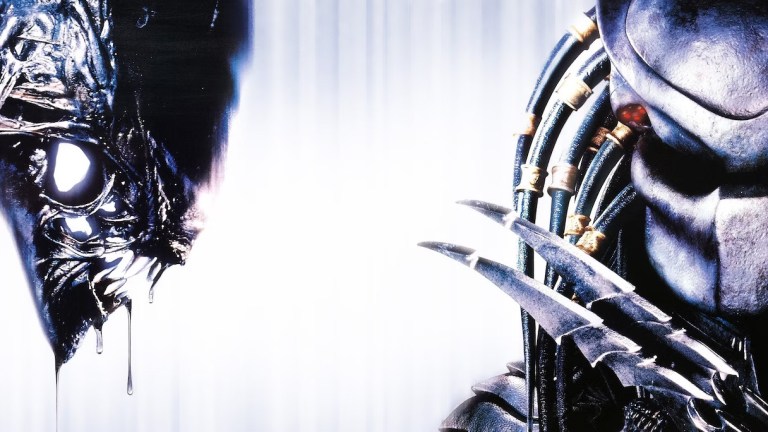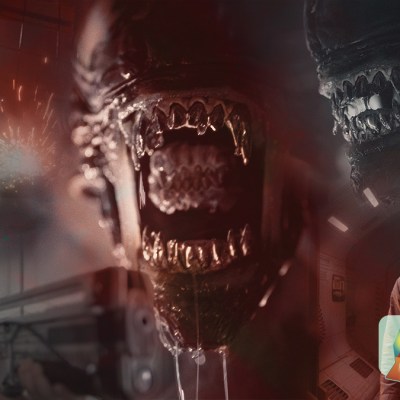It’s Time to Do Alien vs. Predator Again (and Right)
Twenty years ago we all lost when Alien vs. Predator fumbled the bag. Now is the time for audiences to win with a great genre crossover.

“Whoever wins, we lose,” read the famous tagline for Alien vs. Predator.
Ask most critics in 2004, and they would insist that we did indeed lose. “The title alone betrays an entire Hollywood mindset of rehash, reheat, recombine. Re-please,” wrote Jessica Winter of Time Out. “A movie based on a video game based on two entirely separate sci-fi horror series—so whatever was interesting in the originals has long been bred out, like double-jointedness,” lamented Ty Burr of the Boston Globe.
These samples captured the general tenor of the critical response, which decried AvP as an unholy diluting of two venerable franchises, a mess that no one in their right mind would want. According to these critics, AvP could appeal to no one who hadn’t read the original Dark Horse comic books, played the video games, or watched and re-watched the xenomorph tease at the end of Predator 2.
Of course the critics were wrong. Lots of people wanted to see Alien vs. Predator, which made more than twice its budget at the box office. So popular was the first movie that the even worse 2007 sequel, Alien vs. Predator: Requiem, grossed $130 million on a $40 million budget.
What did the critics misunderstand about AvP? Certainly, it wasn’t their assessment of the movie’s construction, which suffers from the same poor storytelling and flat characters in every other Paul W.S. Anderson movie, further hobbled by a PG-13 rating. Nor was its reverence for the original films, as the crossover sequel’s use of thermal vision and chestbursters gave audiences what they wanted, but little of the ingenuity or terror those same devices employed decades earlier.
No, what the critics failed to understand was the rise of fan culture in the early 2000s: audiences who placed fidelity to their preferred interpretations of characters or “universes” over aesthetic concerns. And it’s that very fan culture, now dominant in Hollywood, which is why the time is right for a new Alien vs. Predator movie.
Hunting For Hits
Despite the promises of the match-up, the Alien and Predator franchises weren’t on the same footing, at least not in 2004. At that point, Predator had just two big screen entries, one of which came from Stephen Hopkins, right off of A Nightmare on Elm Street 5: The Dream Child. 1987’s Predator fares much better, thanks to the great Stan Winston effects and perfect direction from John McTiernan, but it is fundamentally a genre riff. The themes of American exceptionalism and toxic masculinity are secondary to its portrayal of musclebound dudes who face off against an unstoppable opponent. It’s the most salacious selling point of The Most Dangerous Game streamlined for the Reagan Years and post-The Terminator.
Alien, on the other hand, garnered far more respect. Thanks to Ridley Scott’s direction, a killer idea from writer Dan O’Bannon, and a steady hand on the production from Walter Hill, Alien transcended its “haunted house in space” premise to become a classic about blue-collar resilience and male fears of impregnation and bodily violation. Each of the three successive films also boasted auteurs behind the camera, including James Cameron and David Fincher (even if the latter disowned Alien 3). Alien: Resurrection may be a hot mess, but at least it’s an interesting mess thanks to the involvement of French filmmaker Jean-Pierre Jeunet.
In other words, Alien vs. Predator diminished Alien in the eyes of many, bringing the better franchise down to Predator’s trashy level.
Today, the two franchises are on more equal footing. Yes, Ridley Scott returned to Alien after Resurrection to make Prometheus and Alien: Covenant, two movies rich in theme and ambition, even if they have a checkered reception. Yet for all his significant strengths as a filmmaker, Alien: Romulus director Fede Alvarez specializes in gross-out shocks more than he does thematic depth. And with Disney already putting a Noah Hawley-directed spin-off show on Hulu, it’s clear that Alien doesn’t have the same prestige it once enjoyed.
Conversely, Predator currently stands at a critical high point thanks to the excellent 2022 entry, Prey, which came from director Dan Trachtenberg. Prey comes on the heels of the utter misfire that was The Predator (2018) and the fun if slightly forgotten 2010 entry, Predators.
But all of these came before our current period of IP curation.
The Perfect IP Machine
Trachtenberg’s prequel movie Prey offers a unique take on the Predator concept. Set in the Great Plains in 1719, Prey follows Comanche woman Naru (Amber Midthunder) as she fights back against a Predator who wreaks havoc on her tribe. Prey revitalizes the franchise with compelling human characters and outstanding action sequences.
However, it also contains bits of fan service. Naru’s brother Taabe (Dakota Beavers) repeats the line that “If it bleeds, we can kill it” from the original movie. It even includes Raphael Adolini (Bennett Taylor), a character first introduced in the 1996 comic book titled Predator: 1718.
This combination of first-rate filmmaking and granular nerd stuff isn’t unique to Prey. Superhero movies devote hundreds of millions of dollars and A-list talent to stories about Rocket Raccoon and the Polka Dot Man. Disney regularly makes live-action-esque versions of their classic animated features, casting Will Smith as Aladdin’s Genie and Kevin Kline as Belle’s father.
Because of this emphasis on meeting fan expectations, a modern Alien vs. Predator movie wouldn’t just get shoved off to schlockmeisters like Paul W.S. Anderson or the Brothers Strauss. It wouldn’t get Ridley Scott or James Cameron to direct, but probably someone who made a great small-budget movie (like Trachtenberg and 10 Cloverfield Lane) or a solid genre hand (like Don’t Breathe’s Alvarez).
Moreover, it would get proper care. The same world-building that Trachtenberg achieved in Prey could be applied to a modern AvP, which if handled by a credible filmmaker would play better than the thematically empty temple in the 2004 movie (or whatever’s happening in the mucky darkness of AvP: Requiem). In the same way that Alvarez gets proper practical effects for Alien: Romulus, a modern AvP would have the type of imagery that works best in this kind of film.
Most importantly, it would be put together by people passionate about the project, not just trying to throw together a couple of big names for easy bucks. Would it be anything on the level of the first few Alien movies or the first Predator? No. Of course not. But it would be a proper movie, not an indifferent cash grab.
Intellectual Property: Resurrection
To be clear, I don’t think we need another Alien vs. Predator movie. The concept has always been trashy, and it’s hard to imagine what a new movie could accomplish that the comics and video games haven’t already achieved. Honestly, the best Alien/Predator movie remains the early 2000s convention staple Batman: Dead End, mostly because it’s just eight minutes long.
But Hollywood’s gonna Hollywood, and there’s no way that Disney will let such profitable IP lay fallow. If they’re going to make a new Alien vs. Predator movie anyway, it’s hard to imagine a better time than now when studios will put some care into the project. The respective franchises may lose, but at least we’ll win.


